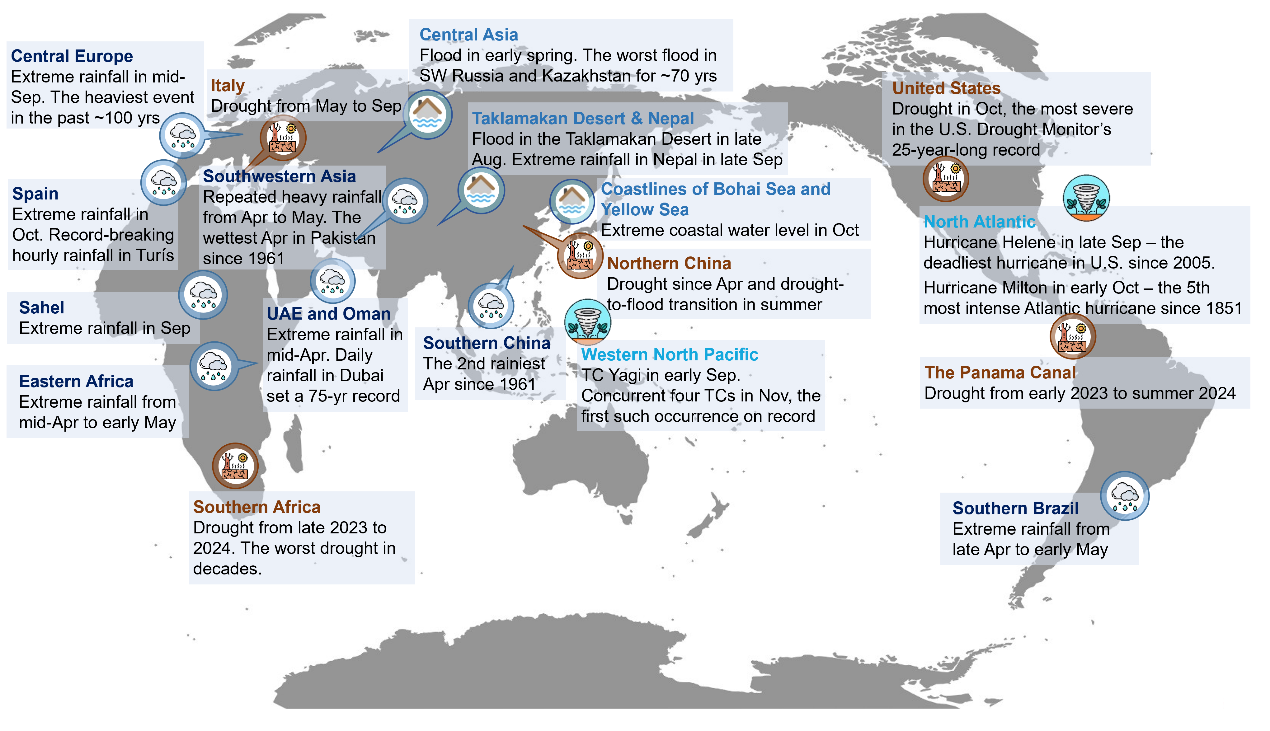From the persistent droughts in southern Africa and Central America earlier this year to the more recent extreme rainfall in Spain and the deadly Hurricane Helene along the American east coast, 2024 has been marked by climate events that have impacted the lives of billions of people.
In a recent study published in Advances in Atmospheric Sciences, an international team of scientists, led by Prof. Dr. ZHANG Wenxia from the Institute of Atmospheric Physics of the Chinese Academy of Sciences, provided an overview of the characteristics and impacts of the most notable extreme events of the year, including rainfall and flooding, tropical cyclones, and droughts. They also discussed the causes of these events, the role of global warming, and the challenges humanity faces in becoming "climate-resilient." The research team has been conducting an annual review of global climate extremes since 2022, and this year they identified exceptional rainfall and flooding as significant trends.
"Most extreme events have a considerable random element; they are influenced by fluctuations in weather and occur when weather patterns align in the 'right' way. Some extremes are more likely due to larger-scale drivers, such as El Niño-Southern Oscillation (ENSO), which can influence weather patterns in a region," said Dr. James Risbey at CSIRO, a co-author of the study.
Many of the extreme rainfall and drought events of 2024 were linked to the atmospheric conditions associated with El Niño during the winter of 2023/24. According to studies on extreme event attribution, commonly referred to as "attribution science," it is clear that human-induced climate change, occurring since the pre-industrial era, has exacerbated extreme rainfall, tropical cyclones, and droughts, thereby amplifying their socioeconomic impacts.
"The influence of climate change can be direct through physical processes causing the extreme events or indirect by affecting the weather, large-scale drivers, and critical baselines," Dr. Risbey explained.
"This aligns with the fundamental physical understanding that human-induced warming leads to increased atmospheric moisture and evaporative demand, potentially enhancing extreme rainfall and droughts," said Prof. ZHANG.
Despite understanding why the world is experiencing increasingly severe and frequent extreme climate events, the research team emphasized that significant challenges remain in our knowledge and attribution of these occurrences. Notably, inconsistencies between observed and modeled extremes-especially for extreme rainfall-limit our confidence in attribution results.
Dr. Piotr Wolski from the University of Cape Town emphasized the importance of increasing the quality of forecasts. However, he argued that it is even more important to effectively disseminate warnings and take action to reduce existing vulnerabilities to mitigate the impacts of extreme events. He highlighted the concept of being "climate-resilient," which has become a critical component of our comprehensive approach to addressing climate change and its effects on society.

Major weather and climate extremes in 2024. (Image by Zhang et al.)






